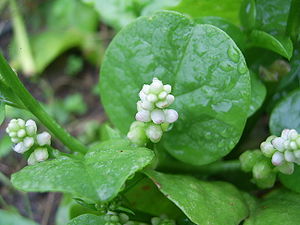Note: This is a project under development. The articles on this wiki are just being initiated and broadly incomplete. You can Help creating new pages.
Difference between revisions of "Basella alba - Indian Spinach"
m (Arun93 moved page Basella Alba - Indian Spinach to Basella alba - Indian Spinach: Name corrected) |
|||
| Line 1: | Line 1: | ||
[[File:Basella alba-2.JPG|thumb|right|'''Basella Alba''']] | [[File:Basella alba-2.JPG|thumb|right|'''Basella Alba''']] | ||
| − | + | '''Basella alba''' is a botanical name of Indian Spinach. As name suggests this plant belongs to India and China. Basella alba is known under various common names, including Malabar Spinach vine spinach, red vine spinach, climbing spinach, creeping spinach, buffalo spinach and Ceylon spinach among others. | |
| − | '''Basella | ||
==Uses== | ==Uses== | ||
| Line 10: | Line 9: | ||
==Chemical Composition== | ==Chemical Composition== | ||
| − | The essential amino acids are arginine, leucine, isoleucine, lysine, threonine and tryptophan | + | The essential amino acids are arginine, leucine, isoleucine, lysine, threonine and tryptophan.<ref name="chemical composition"/> |
==Common names== | ==Common names== | ||
| Line 42: | Line 41: | ||
===Fruit=== | ===Fruit=== | ||
| − | {{Fruit||7–10 mm (0.28–0.4 in.) long pome| | + | {{Fruit||7–10 mm (0.28–0.4 in.) long pome|Clearly grooved lengthwise, Lowest hooked hairs aligned towards crown|With hooked hairs|}} |
===Other features=== | ===Other features=== | ||
| Line 53: | Line 52: | ||
==How to plant/cultivate== | ==How to plant/cultivate== | ||
| − | Can be easily grown from seeds and cuttings | + | Can be easily grown from seeds and cuttings.<ref name="How to plant/cultivate"/> |
==Commonly seen growing in areas== | ==Commonly seen growing in areas== | ||
Revision as of 10:19, 1 April 2020
Basella alba is a botanical name of Indian Spinach. As name suggests this plant belongs to India and China. Basella alba is known under various common names, including Malabar Spinach vine spinach, red vine spinach, climbing spinach, creeping spinach, buffalo spinach and Ceylon spinach among others.
Contents
- 1 Uses
- 2 Parts Used
- 3 Chemical Composition
- 4 Common names
- 5 Properties
- 6 Habit
- 7 Identification
- 8 List of Ayurvedic medicine in which the herb is used
- 9 Where to get the saplings
- 10 Mode of Propagation
- 11 How to plant/cultivate
- 12 Commonly seen growing in areas
- 13 Photo Gallery
- 14 References
- 15 External Links
Uses
Dysentery, Diuretic, Febrifuge, Catarrh, Boils, Conjunctivitis, Pimples, Diarrhea, Sore throats
Parts Used
Chemical Composition
The essential amino acids are arginine, leucine, isoleucine, lysine, threonine and tryptophan.[1]
Common names
| Language | Common name |
|---|---|
| Kannada | Bansali |
| Hindi | Poi |
| Malayalam | Vasalaccira |
| Tamil | Vasalakkirai |
| Telugu | Bachali, Bachchali-kura, Karubachali |
| Marathi | NA |
| Gujarathi | NA |
| Punjabi | NA |
| Kashmiri | NA |
| Sanskrit | Upodika |
| English | Indian spinach, Malabar Spinach |
Properties
Reference: Dravya - Substance, Rasa - Taste, Guna - Qualities, Veerya - Potency, Vipaka - Post-digesion effect, Karma - Pharmacological activity, Prabhava - Therepeutics.
Dravya
Rasa
Tikta (Bitter), Kashaya (Astringent)
Guna
Laghu (Light), Ruksha (Dry), Tikshna (Sharp)
Veerya
Ushna (Hot)
Vipaka
Katu (Pungent)
Karma
Kapha, Pitta
Prabhava
Habit
Identification
Leaf
| Kind | Shape | Feature |
|---|---|---|
| Simple | The leaves are divided into 3-6 toothed leaflets, with smaller leaflets in between |
Flower
| Type | Size | Color and composition | Stamen | More information |
|---|---|---|---|---|
| Unisexual | 2-4cm long | Yellow | 5-20 | Flowers Season is June - August |
Fruit
| Type | Size | Mass | Appearance | Seeds | More information |
|---|---|---|---|---|---|
| 7–10 mm (0.28–0.4 in.) long pome | Clearly grooved lengthwise, Lowest hooked hairs aligned towards crown | With hooked hairs | {{{6}}} |
Other features
List of Ayurvedic medicine in which the herb is used
Where to get the saplings
Mode of Propagation
How to plant/cultivate
Can be easily grown from seeds and cuttings.[3]
Commonly seen growing in areas
Moist places in hedges, Elevations around 500 metres in Nepal.
Photo Gallery
References
External Links
- Systematic pharmacognostical, phytochemical andpharmacological review on an ethno medicinal plant,Basella alba L.
- A review of the taxonomy, ethnobotany, phytochemistry and pharmacology of Basella alba
- Nutritional Analysis, Phytochemical Screening, and Total Phenolic Content of Basella alba Leaves from the Philippines
- Basella alba L on medicanal plants
- Ayurvedic Herbs known to be helpful to treat Dysentery
- Ayurvedic Herbs known to be helpful to treat Diuretic
- Ayurvedic Herbs known to be helpful to treat Febrifuge
- Ayurvedic Herbs known to be helpful to treat Catarrh
- Ayurvedic Herbs known to be helpful to treat Boils
- Ayurvedic Herbs known to be helpful to treat Conjunctivitis
- Ayurvedic Herbs known to be helpful to treat Pimples
- Ayurvedic Herbs known to be helpful to treat Diarrhea
- Ayurvedic Herbs known to be helpful to treat Sore throats
- Herbs with Leaves used in medicine
- Herbs with Stem used in medicine
- Herbs with common name in Kannada
- Herbs with common name in Hindi
- Herbs with common name in Malayalam
- Herbs with common name in Tamil
- Herbs with common name in Telugu
- Herbs with common name in Sanskrit
- Herbs with common name in English
- Habit - Perennial Climber
- Index of Plants which can be propagated by Seeds
- Index of Plants which can be propagated by Cuttings
- Herbs that are commonly seen in the region of Moist places in hedges
- Herbs that are commonly seen in the region of Elevations around 500 metres in Nepal
- Herbs
- Basellaceae






